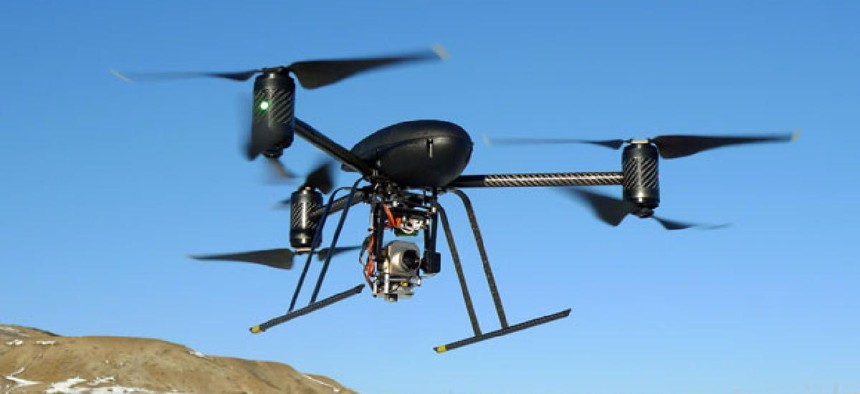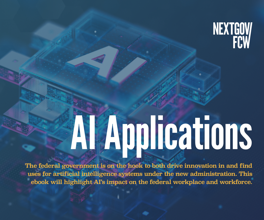Drone Lobbyist: 'I Don't Use the Word Drone'

Mesa County Sheriff's Unmanned Operations Team/AP
National Journal catches up with Michael Toscano, chief of the unmanned vehicle industry group.
Drones are coming to U.S. skies. The Federal Aviation Administration is charged with finding a safe way for drones to fly for commercial purposes by 2015, but civil-liberties advocates worry that privacy rights might suffer.
As the debate continues, National Journal caught up with Michael Toscano, chief of Washington’s drone lobby, the Association for Unmanned Vehicle Systems International, who says that one day, the “truth will prevail” and Americans will see how flying robots can make this country better. Edited excerpts follow.
NJ: Do you think drones have an image problem?
Toscano: I don’t use the word drone. There’s a Hollywood expectation of what a drone is. Most of it is military; most of it is very fearful, hostile. These things are not that. More than 50 percent of them are going to weigh less than 5 pounds.
There’s a very large upside to this technology, and there are issues that have to be addressed. Obviously the privacy issue needs to be addressed and put in context with the other issues. With any revolutionary-type technology there are good things that can be done with it but there are situations where people can misuse this.
Automobiles [cause the deaths of more than 30,000 people in the U.S. each year,] but we still accept that technology. My car has ability to go 120 miles per hour, but if I do I recognize I am breaking the law. If I get in an accident and kill someone, it can be a deadly weapon that doesn’t mean we should ban all cars. You have to hold people accountable.
NJ: Media coverage has focused largely on law enforcement using drones for surveillance. What are some more unusual applications for drones?
Toscano: We will use these things for any dirty, dangerous, or dull missions. [The National Oceanic and Atmospheric Administration] can sample the air. Microspores transmit not just across states but countries—and to be able to predict where diseases are spreading, the earlier you can come up with proper antidotes. There are places in the world [that don’t have year-round access to roads]. When the roads [flood], there’s no way to transmit medicines. If you had unmanned aircraft systems that can carry [light payloads], you could have a network to still provide supplies. In Oklahoma, there are [a lot of tornadoes]. Even five minutes more warning can make the difference between saving a life or not.
NJ: What do you make of the backlash from privacy advocates?
Toscano: I would contend that a lot of the facts and good information are not being relayed to decision makers. A lot of the voices that you’re hearing are coming from civil-liberty groups: the American Civil Liberties Union, Electronic Privacy Information Center, Electronic Frontier Foundation, and others who have been concerned with privacy for last 50 years and have now used this as a way of driving home a point.
If you look at previous revolutionary-type technologies, if you use cell phones, if you use a computer, if you use GPS in your car, these are all leap-forward type of technologies that when introduced had an effect on your privacy. I would contend that the Fourth Amendment, the laws that we have had on the books for over 220 years, still provide the foundation to protect your privacy.
NJ: Do you think the FAA is on track to integrate the airspace?
Toscano: Safety is paramount. Period. The FAA’s job is to make sure that anything that goes into the national airspace is safe, that it can sense or see and avoid aircraft and not run into anything else, and doesn’t fall out of the air and hurt and kill somebody. Having said that, what’s the timeline?
Congress has established timelines to which the FAA needs to respond. The FAA is in a flux period right now; if they do not have resources I don’t think they can do the job in the timelines. There are people being furloughed, laid off. If you look at what’s happening in the country things are being delayed and not sped up.
But the FAA is not responsible for privacy. Our Congress is; our judiciary is; states are. They’re the ones who put the laws in place.
NJ: Do you think Americans will eventually accept this technology?
Toscano: I’m a very optimistic person, so I’m going to say yes; I think the truth will prevail once people understand the facts and figures. You’ll have the early adopters, then all of a sudden people will get wind of it.
--
This article appeared in the Thursday, March 28, 2013 edition of National Journal Daily.
NEXT STORY: UPDATED: DOD reduces furlough days






